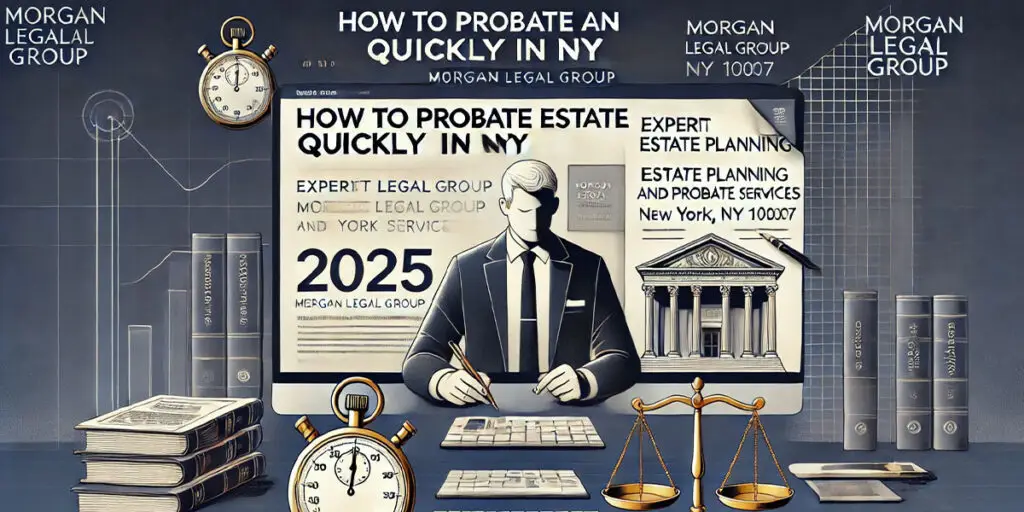How to Probate an Estate Quickly in New York 2025
Introduction: Simplifying Probate in New York
Probate in New York can be time-consuming, often compounded by legal complexities and family dynamics. At Morgan Legal Group, we understand the importance of efficiency, especially when beneficiaries and executors seek to finalize estate matters promptly. This guide outlines the steps and strategies for expediting probate under New York law in 2025 while ensuring compliance with legal requirements.
Understanding Probate in New York
What Is Probate?
Probate is the court-supervised process of validating a deceased person’s will, paying debts and taxes, and distributing the remaining assets to beneficiaries. In New York, probate is overseen by the Surrogate’s Court in the county where the deceased resided.
Why Does Probate Take Time?
The timeline for probate can vary based on factors such as:
- The complexity of the estate.
- The presence of disputes among heirs or beneficiaries.
- Outstanding debts, taxes, or legal challenges.
- Delays in filing required paperwork or obtaining court approvals.
You can proactively streamline the process by understanding the steps and potential roadblocks.
Steps to Probate an Estate Quickly
1. Locate the Original Will
The first step in any probate process is locating the deceased’s original will. The will must be submitted to the Surrogate’s Court for validation. If no will exists, the estate will proceed under New York intestacy laws, which can complicate and lengthen the process.
2. Appoint the Executor
They will typically name an executor responsible for managing the estate during probate. If no executor is named or willing to serve, the court will appoint an administrator, which can delay proceedings.
3. File the Probate Petition
The executor or administrator must file a petition for probate in the appropriate Surrogate’s Court. This filing includes essential documents such as:
- The original will (if available).
- A certified death certificate.
- An inventory of the deceased’s assets.
- Notices to interested parties.
4. Notify Beneficiaries and Creditors
New York law requires notifying all heirs, beneficiaries, and creditors of the probate proceedings. Efficient communication and accurate documentation can prevent disputes and delays.
5. Pay Debts and Taxes
The executor must ensure that all outstanding debts, funeral expenses, and taxes are paid before distributing assets. This includes:
- Filing final income tax returns.
- Paying estate taxes, if applicable.
- Settling claims from creditors.
6. Distribute Assets
Once debts and taxes are resolved, the executor can distribute the remaining assets to beneficiaries as outlined in the will. Proper documentation and transparency during this stage are essential to avoid disputes.
Strategies for Speeding Up Probate
1. Work with an Experienced Probate Lawyer
Navigating probate laws and court procedures can be daunting. Hiring an experienced probate lawyer ensures compliance with legal requirements, minimizes errors, and expedites court filings.
2. Leverage Pre-Probate Planning
Effective estate planning can significantly reduce the time and effort required for probate. Strategies include:
- Creating a revocable living trust to bypass probate for certain assets.
- Designating beneficiaries for retirement accounts and insurance policies.
- Holding property jointly to transfer ownership directly to the surviving owner.
3. Maintain Accurate Records
Executors should keep meticulous records of all transactions, communications, and court filings. Clear documentation prevents misunderstandings and ensures compliance with court requirements.
4. Resolve Disputes Early
Family disagreements and contested wills can cause significant delays. Mediation or arbitration can help resolve disputes amicably and avoid lengthy court battles.
5. File Taxes Promptly
Delays in filing estate and income tax returns can prolong probate. Working with a tax advisor familiar with New York laws can expedite this process.
Common Challenges in New York Probate
1. Missing or Invalid Wills
A missing or improperly executed will can lead to complications, including applying New York’s intestacy laws. Ensuring a valid, updated will is essential to avoid this issue.
2. Complex Estates
Estates with multiple properties, business interests, or international assets require specialized expertise. A probate attorney can handle these complexities efficiently.
3. Claims from Creditors
Executors must address all creditor claims, which can be time-consuming. Clear communication and prompt payments can prevent delays.
4. Disputes Among Heirs
Heir disputes over asset distribution are a common cause of probate delays. A well-drafted will and open communication can mitigate this risk.
How Morgan Legal Group Can Help
1. Expert Guidance
At Morgan Legal Group, our seasoned probate attorneys have extensive experience handling estates of all sizes. We navigate the legal complexities so you can focus on what matters most.
2. Efficient Process Management
Our team ensures that all filings, notifications, and court requirements are completed accurately and on time, minimizing delays.
3. Customized Solutions
Every estate is unique. We provide tailored advice and strategies to address your specific needs, ensuring a smooth probate process.
Conclusion: Expedite Probate with Confidence
Probate doesn’t have to be a prolonged or stressful process. By understanding the steps, implementing effective strategies, and working with a trusted legal team like Morgan Legal Group, you can navigate probate quickly and efficiently in New York. Contact us today to schedule a consultation and take the first step toward easily resolving your probate matters.









